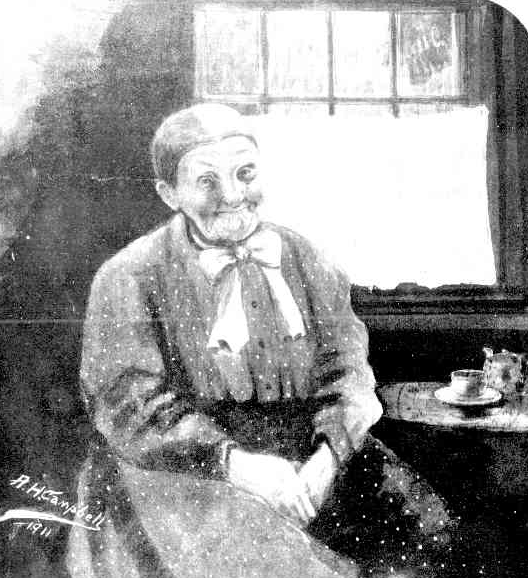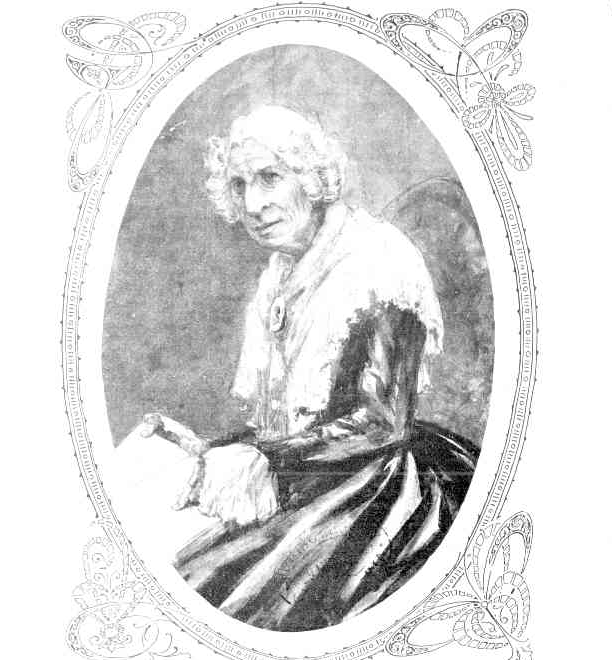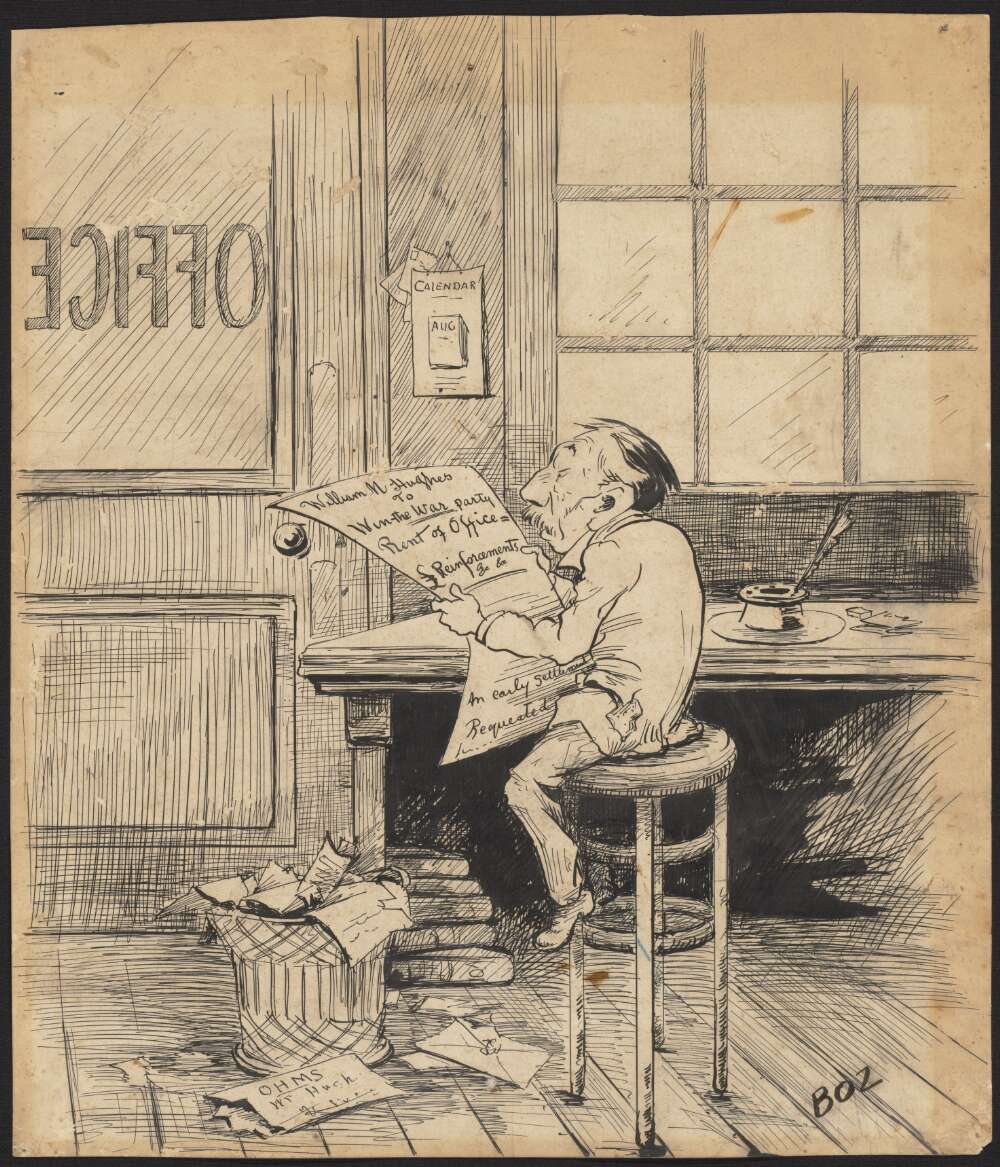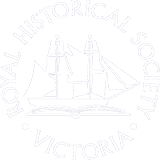Annie Jane Hope Campbell (c1866 – 1920) Artist, caricaturist
Born in Belfast in about 1866, Annie Jane Hope Campbell was one of four children of Samuel Watson Campbell, a merchant, and his wife Annie Holmes.
She spent her early life in Belfast then trained at the National Art Training Schools in South Kensington, London, most likely in the late 1880s and early 1890s. The Training School, now absorbed into the Royal College of Art, was then principally a teacher training institution, although it also trained designers and craftsmen, and counted among its alumni the likes of Kate Greenaway, George Clauscen, Gertrude Jekyll and Beatrix Potter.
By 1895, Annie, now a graduate of the Art Training School, arrived in Australia to join her family who had been living in Melbourne since the mid-1880s. Her older siblings remained in the UK, her sister Elizabeth marrying William McFadden Orr, Professor of Mathematics based in Dublin and brother Samuel marrying in London in 1900. The following year, Samuel (known in the family as Charlie), wife Agnes and infant daughter Dora settled in Sydney where Charlie died in 1903, of tuberculosis, according to a family member.
Annie lived with her family in Kooyong Road, Malvern, earning her living through her art. She went where the commissions took her and this meant that from October to December 1897 she travelled extensively in the West Australian goldfields, particularly Kalgoorlie, sketching important figures in the political and economic landscape of the area. Her sketches appeared regularly in the Kalgoorlie newspapers, in which Annie was identified as the sketch artist ‘Boz’, so it seems she styled herself an Australian Charles Dickens. Her distinctive signature makes her work easy to identify, whether she used the name ‘Boz’, her initials AJHC or Annie Hope Campbell.

Image: Bagging ore at the Australia Mine, Kalgoorlie. Critic, 27 November 1897.

Image: W.A. Irwin, General Manager, Associated Mines. Critic, 13 November 1897.
Shortly after her return to Melbourne she set off once more, in April 1898, this time aboard the Ormuz bound for London, her ultimate destination Dublin where it is likely she visited her half-sister Elizabeth Orr. On board the Ormuz was one of the cricket sensations of the day, Ranjitsinhji Vibhaji Jadeja (known as ‘Ranji’), an Indian who played cricket for England and who was later the ruler of the Indian Princely state of Nawanaga. A few days into the journey, Annie sketched a rattan chair decorated with crossed cricket bats, a gift from a ‘Melbourne Lady Admirer’ to the celebrity cricketer.

Image: Critic (Adelaide), 9 April 1898, p.7. Sketch of Ranji’s Australian Souvenir. Presented by a Melbourne Lady Admirer. It is signed Annie J. Campbell, HMS ‘Ormuz’, off Adelaide.
It was not until March 1901 that Annie appeared in the Australian newspapers again, so it is possible that hers was a prolonged visit to Britain, to attend the London wedding of her brother Samuel Campbell, perhaps and almost certainly to spend time with her sister Elizabeth in Dublin.
During this period, Annie was not the only member of the Australian Hope Campbells to be absent from Australia, her brother Edmund serving as a Trooper under Lieutenant-Colonel Byng during the Boer War (1899-1901).
On Annie and Edmund’s return to Australia, the three Hope Campbell siblings – Annie, Edmund and Edith – lived in the family home ‘Inverary’ in Kooyong Road, Malvern with their parents. Edmund married Ethel Graham in 1911 and Edith married Ethel’s brother Roland in 1917. Annie, who did not marry, continued to live at home.
Although Annie’s sister Edith identified as an artist in several electoral rolls, she revelled in the outdoors life. She was a horsewoman, an animal lover and a leading member of the Kennel Club and the Ladies Rifle Club.
Annie, whose health was never robust, practised her art and journalism when her health permitted, was a member of the Historical Society of Victoria and the Lyceum Club, taught art and undertook commissions.
In May 1909, when the embryonic Historical Society of Victoria (later the Royal Historical Society) put out a call for reminiscences of early pioneers, Annie made contact, saying that she had a collection of reminiscences and portraits to offer the Society. She joined on 14 July 1909, being the Society’s sixty-ninth member and the third woman member. Her father, Samuel Watson Campbell, also joined and he is recorded as being RHSV member #3.
Annie took the Society’s call to collect reminiscences to heart and in that first year, she donated drawings of old colonists, including a portrait of ‘Rolf Boldrewood’ (Thomas Browne), the author of Robbery Under Arms. Her interview with Boldrewood appeared in the Leader newspaper, as did other pieces on poet Adam Lindsay Gordon and ‘old colonists’ such as Horace Claringbold, A Crimean War veteran; Mrs William Bertram who arrived in Melbourne as an eleven year old in the first year of white settlement; Miss Clara Murton of North Fitzroy, a pioneer of education and John Waugh who had lived in Melbourne for 74 years and whose reminiscences can be found in the RHSV’s Manuscripts Collection.

Image: Rolf Boldrewood, Leader, 15 May 1909.

Image: Mrs William Bertram, Leader, 8 July 1911.

Image: Horace Claringbold and wife, Leader, 19 March 1910.

Image: Miss Clara Murton, Leader, 25 May 1912.
At the end of 1912, Annie resigned as a member of the Historical Society. This was the year of her mother’s death and perhaps that, and the long periods of inactivity forced on her by ill health, explain her withdrawal from the Society.
She pursued her art whenever possible. The newspapers of the day provide brief glimpses of her work, Table Talk reporting in April 1911 that she had just completed a frieze for the nursery of a Melbourne socialite. Comprising twenty-five drawings based on familiar nursery rhymes and ‘full of life and movement’, we are told that ‘the treatment is so original … that even grown ups are fascinated.’ Later, in 1916, at a dinner in honour of Katherine Susannah Prichard, who had just won the Hodder and Stoughton prize for best Australian novel with The Pioneers, Melbourne artists created menu cards illustrating scenes and characters from the novel. Annie’s card was presented to the author.
One of the few examples of Annie Hope Campbell’s work in public collections can be found at the National Library of Australia. It is a caricature of Billy Hughes reading a document in his War Office. Signed ‘Boz’, this pen and ink drawing was made during the war years, a time when Annie was actively fund-raising for the war effort through her art.

Image: Image courtesy National Library of Australia, ID number 6340921.
Annie articulated her position on Australia’s participation in World War One through her art. She created and donated a number of patriotic posters, all auctioned to raise funds for the war effort. Like Jessie Webb, the first woman to join the Historical Society, Annie was actively pro-war. There were others within the Historical Society, such as Professor William Harrison Moore and his wife Edith, and barrister John Latham, married to Webb’s friend Ella Tobin. The women, at least, would have known each other through the Lyceum Club.
In December 1915, Annie created a stir when it was revealed that ‘Boz’, the winner of the State Parliamentary Recruiting Committee Poster design competition, was actually Miss Annie J. Hope Campbell, the only woman entrant, the Weekly Times declaring that she had ‘wrested the recruiting poster prize from 280 competitors’. It was shown for the first time at a crowded patriotic meeting of the National Council of Women (NCW) at the Melbourne Town Hall in January 1916. The Herald commented that ‘it was a fitting tribute to the artist that her design should make its first public appearance at a meeting convened by women.’ The newspaper could have added it was fitting, too, that it should have been so feted at a meeting of the NCW in Victoria where the members saw working for peace as tantamount to treason.

Image: Annie Hope Campbell’s prize winning World War One recruiting poster ‘Come Lads, Give Us a Spell’. Courtesy Australian War Memorial. ARTV07585.
Within a year of the war’s ending, Annie Campbell died of cancer at ‘Windarra’ Private Hospital in Toorak. She was fifty-four. She is buried in the Presbyterian Section of St Kilda Cemetery with her brother Edmund, his wife Ethel and her sister Edith and her husband Roland Graham. Their parents are buried in a nearby grave.
Cheryl Griffin June 2020
Sources:
RHSV archives – minutes, early correspondence; membership records
RHSV – John Waugh’s reminiscences, Collection Lounge https://www.historyvictoria.org.au/collections-lounge/personal-reminiscences-of-john-waugh/ based on material in RHSV Manuscripts Collection (MS 000091).
Irish baptismal records (found on Ancestry and Family Search)
English birth, death, marriage indexes
English 1901 Census
Ancestry family trees
Victorian electoral rolls
Victorian birth, death, marriage indexes
Sands and McDougall street directories
St Kilda Cemetery records
Probate and wills, PROV.
Victorian Shipping records (PROV)
UK Shipping records (via Ancestry)
For her half-sister Elizabeth Orr http://mathshistory.st-andrews.ac.uk/Biographies/Orr.html
Australian War Memorial collection
National Library of Australia collection
Age, 10 June 1903, 18 Dec 1908, 22 December 1915, 23 Feb 1916.
Argus, 11 Nov 1903.
Australasian, 1 Jan 1898, 28 March 1898, 23 Oct 1920.
Brighton Southern Cross, 9 March 1901.
Clare’s Weekly (Perth), 23 Oct 1897, 4 Dec 1897, 9 April 1898
Critic (Adelaide), 13 Nov 1897, 27 Nov 1897, 12 Feb 1898, 19 Feb 1898, 5 March 1898, 9 April 1898.
Evening News (Sydney), 25 Jan 1901.
Graphic of Australia, 14 Sep 1917.
Herald, 22 Dec 1915, 25 Jan 1916, 22 Feb 1916, 14 Oct 1920, 19 Oct 1920.
Kalgoorlie Miner, 21 Oct 1897, 22 Oct 1897, 30 Nov 1897,
Kalgoorlie Western Argus, 28 Oct 1897
Leader, 15 May 1909, 8 January 1910, 19 March 1910, 28 February 1911, 8 April 1911, 8 June 1911, 30 Dec 1911, 25 May 1912, 19 October 1912
Melbourne Punch, 11 July 1895
Punch, 3 January 1907, 6 Nov 1913
Quiz and the Lantern (Adelaide), 16 Dec 1897,
Sydney Mail, 18 November 1903
Table Talk, 10 March 1904, 6 April 1911, 6 Jan 1916.
Weekly Times, 1 Jan 1916, 23 October 1920
Western Mail (Perth), 28 October 1920.
Damousi, Joy, ‘Hidden by the myth: Women’s leadership in war and peace’, in Stephens, David & Broinowski, Alison, The Honest History Book, New South Publishing, Sydney, 2017, pp211-224.
Quartly, Marian and Smart, Judith, Respectable Radicals: A History of the National Council of Women of Australia 1896-2006, Monash University Publishing, Clayton, Victoria, 2015.
Smart, Judith, ‘Women Waging War: The National Council of Women of Victoria 1914-1920, Victorian Historical Journal, Volume 86, number 1, June 2015, pp 61-82.
Who’s Who in the World of Women, Victoria, Australia. Centenary edition. Vol II, 1934, The Reference Presidents Association, Melbourne, 1934.
Sandra Gilpin, Comber, Co Down, Northern Ireland

 239 A'Beckett Street Melbourne, Victoria, 3000
239 A'Beckett Street Melbourne, Victoria, 3000  03 9326 9288
03 9326 9288  office@historyvictoria.org.au
office@historyvictoria.org.au  Office & Library: Weekdays 9am-5pm
Office & Library: Weekdays 9am-5pm

